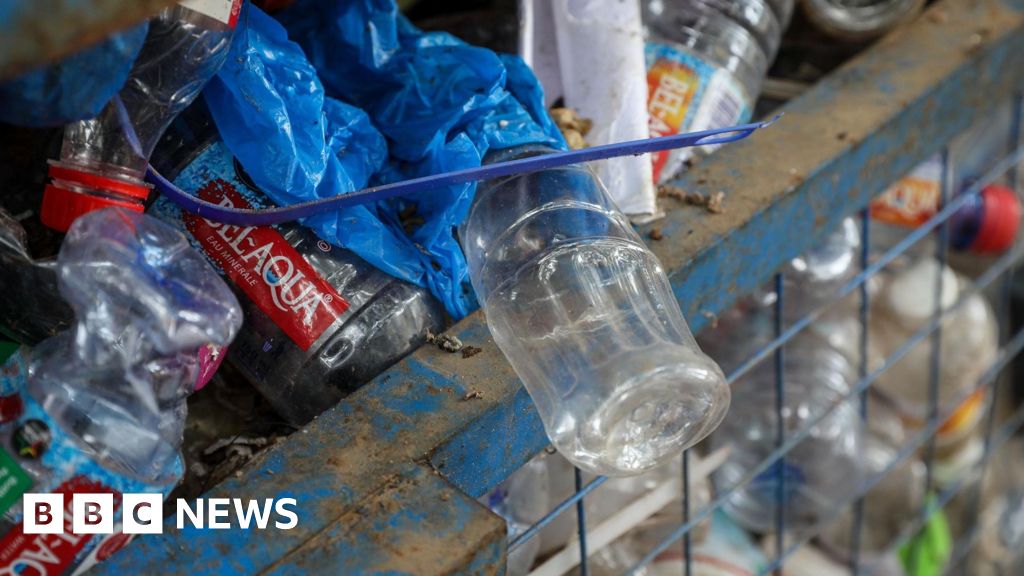Science
Nations Converge in Geneva to Address Global Plastic Crisis

Countries from around the world are gathering in Geneva to negotiate a global treaty aimed at addressing the escalating plastic crisis. After reaching a consensus in 2022 to create a legally binding agreement, progress has stalled for nearly two years, with no treaty finalized. The urgency of the situation has intensified as scientists warn that **nearly 200 trillion** pieces of plastic currently pollute the oceans, a figure projected to triple without significant action.
As nations convene at the United Nations conference, the focus will be on how to effectively curb plastic production and manage waste. The production of synthetic plastics, which began in earnest in the **20th century**, has surged, reaching **475 million tonnes** in 2022, up from just **2 million tonnes** in 1950. This rapid increase has led to a crisis where **approximately 60%** of plastics are single-use, and only **10%** are recycled according to analysis from *Nature*.
Dr. Alice Horton, a research scientist at the National Oceanography Centre, highlighted the historical context of plastic use. “Proportional to life on earth, plastics have been around for no time at all. There are people alive today who did not use plastics as children,” she stated. The versatility of plastics has made them integral to various applications, from medical equipment to packaging, yet the environmental consequences are becoming increasingly apparent.
The environmental impact of plastics is particularly concerning for marine wildlife. Zaynab Sadan, global plastics policy lead at WWF, noted that many marine animals ingest plastic, mistaking it for food, which can lead to severe health complications, including fatalities. Once plastic enters the environment, it breaks down into microplastics, which have been found in ecosystems ranging from the deep sea to mountain ranges.
According to the *Lancet Countdown*, health-related issues stemming from plastic pollution are estimated to cost at least **$1.5 trillion** annually in damages. These health risks include respiratory illnesses, cancer, and complications linked to reproductive health. The report emphasizes that **over 16,000 chemicals** are present in plastic products, with many of them being toxic and potentially carcinogenic. Alarmingly, only **25%** of these chemicals have sufficient data on their health impacts, and of those tested, **75%** were categorized as highly hazardous.
Despite the urgent need for action, negotiations have faced significant hurdles. The initial deadline for a treaty was set for **December 2024**, after five rounds of talks yielded no agreement. At the Geneva conference, over **170 countries** will attempt to reach consensus on critical issues, including the establishment of consistent design standards for plastic products, which could facilitate recycling and reduce reliance on virgin plastics. Rob Opsomer, executive lead of plastics and finance at the Ellen McArthur Foundation, explained that the value of recycled materials varies significantly based on product design, with clear bottles being more valuable than colored ones.
While nearly **100 countries**, including the UK, advocate for an ambitious treaty that limits production levels, resistance has emerged from oil-producing nations like Russia and Saudi Arabia. These countries argue that discussions should focus on enhancing recycling efforts rather than reducing production. With the global demand for oil anticipated to peak in the coming years due to a shift towards renewable energy, plastic production may become a vital growth market for the oil industry. For many businesses, the lack of cohesive regulations presents a significant risk. “Businesses don’t want their packaging to contribute to littering,” Opsomer stated, noting that compliance with various standards can also incur substantial costs.
Addressing the single-use plastic issue remains paramount, particularly as food packaging is a leading contributor to plastic waste. Individuals are encouraged to adopt sustainable practices, such as using reusable containers and bags. It is estimated that **over a quarter** of microplastics in the environment originate from car tires, underscoring the need for broader changes in consumer habits.
As the conference unfolds, the stakes are high for both the environment and public health. The outcome of these negotiations could set the stage for a transformative approach to plastic production and waste management on a global scale.
-

 Entertainment2 months ago
Entertainment2 months agoIconic 90s TV Show House Hits Market for £1.1 Million
-

 Lifestyle4 months ago
Lifestyle4 months agoMilk Bank Urges Mothers to Donate for Premature Babies’ Health
-

 Sports3 months ago
Sports3 months agoAlessia Russo Signs Long-Term Deal with Arsenal Ahead of WSL Season
-

 Lifestyle4 months ago
Lifestyle4 months agoShoppers Flock to Discounted Neck Pillow on Amazon for Travel Comfort
-

 Politics4 months ago
Politics4 months agoMuseums Body Critiques EHRC Proposals on Gender Facilities
-

 Business4 months ago
Business4 months agoTrump Visits Europe: Business, Politics, or Leisure?
-

 Lifestyle4 months ago
Lifestyle4 months agoJapanese Teen Sorato Shimizu Breaks U18 100m Record in 10 Seconds
-

 Politics4 months ago
Politics4 months agoCouple Shares Inspiring Love Story Defying Height Stereotypes
-

 World4 months ago
World4 months agoAnglian Water Raises Concerns Over Proposed AI Data Centre
-

 Sports4 months ago
Sports4 months agoBournemouth Dominates Everton with 3-0 Victory in Premier League Summer Series
-

 World4 months ago
World4 months agoWreckage of Missing Russian Passenger Plane Discovered in Flames
-

 Lifestyle4 months ago
Lifestyle4 months agoShoppers Rave About Roman’s £42 Midi Dress, Calling It ‘Elegant’









